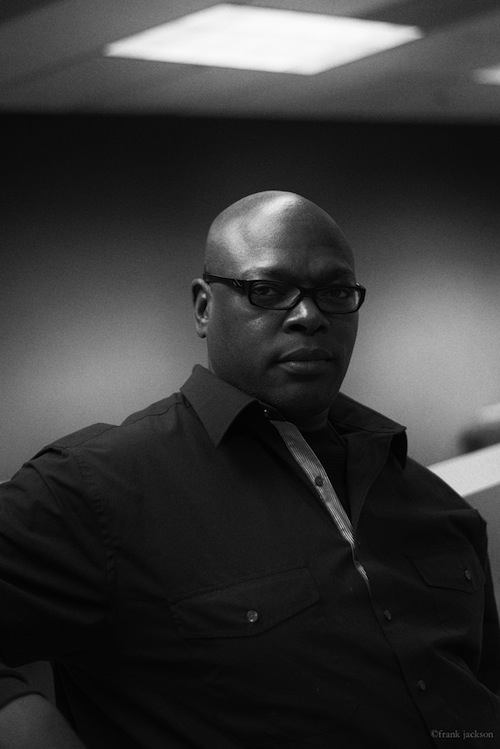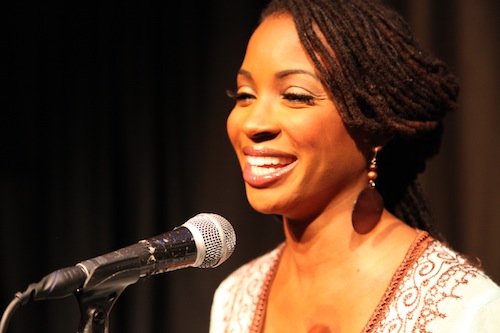
Director Charles Murray
A labor of love – about us, by us
There aren’t too many feature-length movies about a woman’s journey from a loveless marriage to self-discovery and self–empowerment, let alone a Black woman’s sojourn—and let alone by a Black writer-director.
His name is Charles Murray, and the movie is “Things Never Said” at the Rave Cinemas in Baldwin Hills. Murray has crafted a love story that’s bound to be compared with 1997’s “Love Jones,” in which Nia Long plays a photographer to Larenz Tate’s novelist. Or with 1998’s “Slam,” written by Marc Levin, about a prisoner turned poet—even though the 48-year-old Murray himself says this movie “totally moved and inspired him.”
But “Things Never Said” stands on its own. Murray’s parents’ marriage may have served as inspiration for it, but it is a tale that at once intertwines themes of domestic violence (his mom endured years of abuse at the hands of his father, but opted to stay with him until his death), critical life choices and redemption. And, at its heart, the movie exudes extraordinary passion and is a luscious Black love story.

Shanola Hampton
It’s got an exceptionally attractive and talented cast, who all agreed to be in Murray’s film because they fell in love with the script. Beautiful, dimpled, diminutive, braided-haired actor Kalindra Stepney (Shanola Hampton) is married to handsome, strapping ex-basketball jock standout Ronnie (Elimu Nelson), whose basketball injury has not only left him scarred mentally and physically—but Kal too. And then there’s been a miscarriage.
She’s a waitress by day (at M’Dear’s, a real soul food restaurant with really good food on Western Avenue in Los Angeles!) and an outspoken, spoken-word artist by night.

Omari Hardwick
By night she finds refuge, first in performing fierce spoken word entries at the local poetry lounge—and eventually in the arms of fellow poet Curtis Jackson (Omari Hardwick). Despite her best friend’s (Tamala Jones) and Curtis’ brother’s (Michael Beach) admonitions, Kal won’t be trapped in a dead-end marriage like her parents’ (ably played by Charlayne Woodard and Tom Wright), instead opting for an adulterous relationship with Curtis, whose life is headed for a dead end as well, but for different reasons.
Where the characters end up is as much a tribute to the power of Black love as it is about the power of self-awareness and –forgiveness.
Some moviegoers may complain that “Things Never Said” is too melodramatic, the ending too unrealistic. Others will have issues with Kal’s adulterous relationship. Still others may query why domestic violence has to have a role in yet another Black film.
Notwithstanding these quibbles, “Things Never Said” should be seen: Even if you’re not a lover of spoken word, there’s enough of a story to hold your attention—one that’s entertaining and thought-provoking.
And written, directed and distributed by a Black man. Murray, who hails from Gary, Indiana, has been writing since he was 8. Now 48, he’s mostly written for television, including for “Buffy the Vampire Slayer,” “City of Angels” and “Third Watch.” He wrote the script for “Things” in 2003. It’s played at nearly a dozen film festivals around the country.
Inspired by his mother’s tumultuous marriage to his father, Murray says his mother was a serious churchgoer, who sang in the choir and thrived in that environment. Rather than making another movie with church at its center, Murray says he chose the spoken-word arena for what he deemed to be the similarities between the atmosphere around the fervor of church testimony and that of the spoken-word “testimonies” in the lounges he visited.
Go see “Things Never Said,” which is at the Rave Cinemas in Baldwin Hills. It’s not perfect. But it’s important for an independent film that’s written, directed and distributed by a Black filmmaker himself to get on the box office radar so that it can be added to growing list of independent films that studios take notice of. It ends up changing their approach to Black film, and eventually they get behind them, financially.
We always talk about movies not representing us. Remember: Box office dollars are votes. So now that we have a chance to vote with our dollars, let’s vote for and support “Things Never Said” this week.






